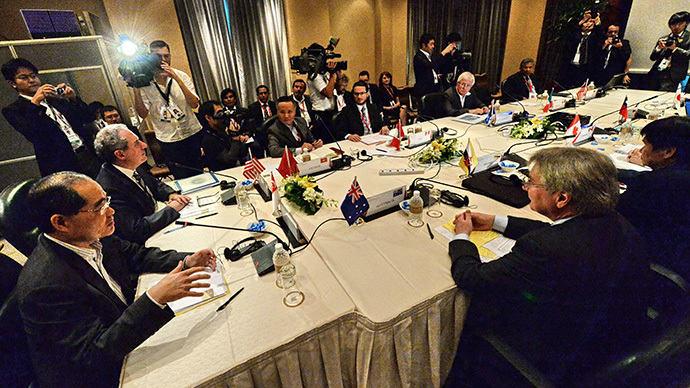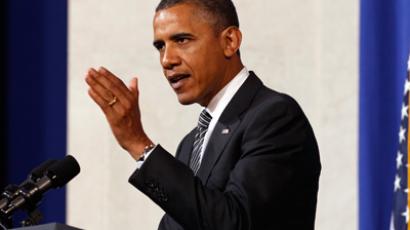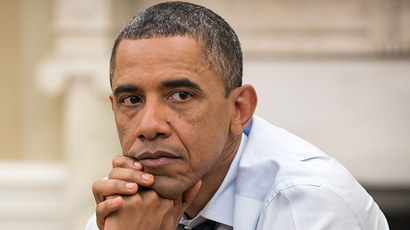Deep divisions over TPP as US pressures to close controversial deal – WikiLeaks

The US is ramping up pressure to secure a Trans-Pacific Trade Deal with conditions that could undermine the national interests of nations involved. WikiLeaks documents say talks are “paralyzed,” with the US refusing to compromise on disputed issues.
Anti-secrecy group WikiLeaks has released two documents revealing
the state of negotiations for the Trans-Pacific Partnership
(TPP). The deal in question includes 12 countries – the United
States, Japan, Mexico, Canada, Australia, Malaysia, Chile,
Singapore, Peru, Vietnam, New Zealand and Brunei – which
represent more than 40 percent of the world’s gross domestic
product.
The 12 nations are in Singapore this week to discuss the trade
agreement. Following a closed-door meeting in Singapore, Japan's
trade minister Yasutoshi Nishimura told press he would like
“the United States to show flexibility.”
"I've already mentioned the parts we can't budge on, so the issue is what both sides can do based on that,” Nishimura said.
Details of the deal had been hidden from the public eye until
last month when WikiLeaks divulged a trove of information
describing the ins and outs of the agreement. Washington has been
criticized for not revealing the details of the agreement.
WikiLeaks’ files show that there is significant disagreement over
119 outstanding issues, with the US refusing to compromise on a
number of contentious issues. It is not clear from which of the
12 countries participating in the talks the leaks came.
“The US is exerting great pressure to close as many issues as
possible this week,” reads one of the documents. “One
country remarked that up until now there had been no perceivable,
substantial movement on the part of the US, and that is the
reason for this situation.”
The Obama administration has called on all parties involved in
the deal to reach an agreement before the end of the year.
However, disputes over key issues may lead to “a partial
closure scenario or even a failure in December.”
The deal has been hailed by Washington as a “number one
priority” that will boost the economies of all the
participating countries. But some of the conditions have sparked
criticism that the nations involved in the deal may see their
interests undermined.
Among the issues blocking the agreement stipulates new powers for
multinationals that would allow them to challenge country laws in
privately run international courts. Washington has endorsed such
powers in previous trade deals such as the North American Free
Trade Agreement (NAFTA), but conditions in the TPP could grant
multinational more powers to challenge a wider range of laws.
Under NAFTA several companies including Dow Chemicals and Exxon
Mobil have sought to overrule regulations on fracking, oil
drilling and drug patents.
“The United States, as in previous rounds, has shown no
flexibility on its proposal, being one of the most significant
barriers to closing the chapter,” said a memo from one of
the participating countries obtained by the Huffington Post.
Furthermore, among the rumored conditions in the treaty are new
standards that would grant pharmaceutical companies new
intellectual property rights. The regulations would extend
patents, giving companies monopolies on new medications and
potentially pushing up prices in the developing countries
participating in the deal.
“If instituted, the TPP’s IP regime would trample over
individual rights and free expression, as well as ride roughshod
over the intellectual and creative commons,” said WikiLeaks
founder Julian Assange in a November statement. “If you read,
write, publish, think, listen, dance, sing or invent; if you farm
or consume food; if you’re ill now or might one day be ill, the
TPP has you in its crosshairs.”
Rights groups have also voiced their opposition to the treaty and
slammed reforms that they say would limit freedoms on the web.
Organization Open Media have launched a petition against the
TPP’s “extreme online censorship” and have already
collected over 100,000 signatures.














